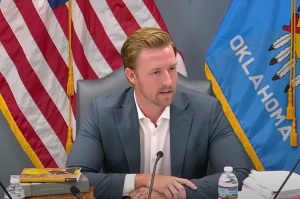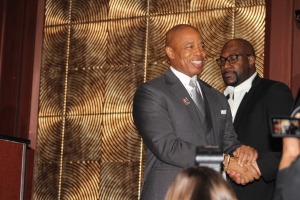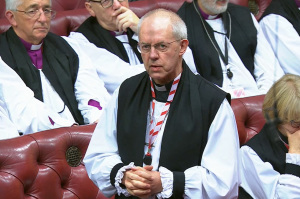Ex-Gay Success Story Not a Mormon Success Story
Clarification appended
Since the former editor of Young Gay America Magazine announced publicly this month that he's been "healed" from homosexuality thanks to God and the Bible, there has been a flurry of discussions – first, over the more-frequently publicized ex-gay movement and second, over the fact that he was baptized into the Mormon church.
"Given the crucial nature of Glatze's religious experience to his testimony, how can evangelical leaders continue to hail Michael Glatze as an ex-gay success story without implicitly endorsing his religious beliefs?" posed Ex-Gay Watch, a watchdog group tracking reparative therapy and the ex-gay movement.
Glatze, however, has made it clear that his transformation through Jesus Christ, which ultimately led him to denounce homosexuality, began in 2003 – four years before he was baptized into the Mormon church. He also says his association with the Church of Jesus Christ of Latter-day Saints – the official name of the Mormon church – is "just part of a huge process and journey," and that he is receiving help from Matt Barber of Concerned Women for America who is suggesting some "scripturally-sound" evangelical churches for Glatze to attend.
This being said, there should be no reason why the Christian community should not embrace Glatze and hail his departure from homosexuality.
"But what if Glatze decides in the end to remain with the LDS church?" some may ask. Would pointing to Glatze's ex-gay success story be endorsing Mormonism?
If, at the end of his "journey," Glatze decides to remain with the Mormon church, the path he will have chosen is most certainly the wrong one, and he will have to later face the consequences of his decision. However, despite what path Glatze chooses, his "coming out" story should not be ignored. The story of change should be used by believers to open the eyes of others like him and to lead them out of the homosexual lifestyle into a more godly one. And doing so is not an endorsement of the Mormon church.
It's a scenario that the Christian community may find themselves faced with next year if presidential hopeful Mitt Romney, a Mormon, becomes the Republican pick for the White House. And already people are asking whether political support for a Mormon candidate somehow translates to support for Mormonism.
Earlier this month on "Larry King Live," the Rev. Dr. R. Albert Mohler – one of the nation's pre-eminent evangelicals – was asked whether or not Romney's faith bothered him.
"Oh, it does certainly concern me as an Evangelical Christian," answered Mohler, who is president of the Southern Baptist Theological Seminary – the flagship seminary of the Southern Baptist Convention. "I have to answer first as a Christian and say I believe Mormonism is a false that is antithetical to historic orthodox Christianity."
"But," he went on to say, "at the same time, I'm not electing a theologian. I'm looking at electing a president, and I will have to consider all of those things in the context of what a candidate represents."
Fellow Southern Baptist Dr. Richard Land, who has met with Romney, gave a similar response, stating that Romney's Mormon background should not be the reason to reject his candidacy.
"Most Southern Baptists understand we're voting for a commander in chief, not pastor in chief," said Land, who is president of the Ethics & Religious Liberty Commission (ERLC) – the SBC's public policy arm. Land, whose words have been echoed by religious leaders and pastors of various faiths, was recently listed by Religion News Service as one of the top 10 most influential GOP "kingmakers."
In the same way, Christians need to understand that pointing to Glatze as an example of overcoming homosexuality should not be equated to supporting the Mormon church. Instead it should be viewed as supporting a very important movement (in this case, the ex-gay movement), as is done during any interfaith activity.
Furthermore, Glatze should be accepted for who he says he is – not the result of Mormon conversion, but one of the latest and most prominent examples of former homosexuals who came to acknowledge homosexuality as sin and made the decision to turn away from the sinful lifestyle.
And as he continues his journey towards truth, believers should be more eager to encourage him to take the right path than to rebuke him for the Mormon "part of [his] "huge process." He hasn't been lost yet, so why treat him as if he is?
Clarification : Friday, July 20, 2007
An editorial on Monday, July 16, 2007, about the debate over a former gay rights activist's "coming out" story originally stated that "believers should be more concerned about Michael Glatze returning to homosexuality than him joining the Mormon church." To clarify, the editorial staff at The Christian Post would like to first of all affirm that it does not view homosexuality as more perverse than Mormonism, despite the wording of the original statement. Furthermore, while Glatze's ties to the Mormon church will undoubtedly be a problem with eternal consequences if he chooses to remain, the editorial staff would like to re-emphasize – as he has emphasized – that the Mormon church is just "part of a huge process and journey" and that he is currently receiving help. And so the staff believes that it would be better for believers to help and encourage individuals such as Glatze – like Matt Barber of Concerned Women for America is doing by suggesting some "scripturally-sound" evangelical churches for Glatze to attend – than to reject and criticize, as is more often the case now. Lastly, the staff believes hailing Glatze as an ex-gay success story does not equate to endorsing whatever beliefs he may have adopted from the Mormon church in the same way that the decision not to reject the candidacy of presidential hopeful Mitt Romney, a Mormon, does not equate to acceptance of Mormonism. Glatze does not claim to have been "healed" by the Mormon church, and neither should anyone else.





























